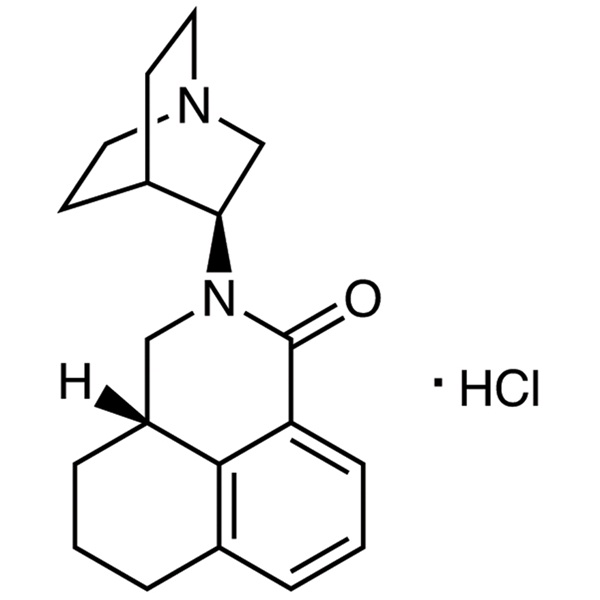Palonosetron Hydrochloride CAS 135729-62-3 Purity >99.0% (HPLC) (T) API Factory
Commercial Supply Palonosetron Hydrochloride and Related Intermediates:
(S)-1,2,3,4-Tetrahydro-1-Naphthoic Acid CAS: 85977-52-2
(R)-1,2,3,4-Tetrahedro-1-Naphthoic Acid CAS: 23357-47-3
(S)-3-Aminoquinuclidine Dihydrochloride CAS: 119904-90-4
3-Quinuclidinone Hydrochloride CAS: 1193-65-3
1-Naphthoic Acid CAS: 86-55-5
Palonosetron Hydrochloride CAS: 135729-62-3 API
| Chemical Name | Palonosetron Hydrochloride |
| Synonyms | Palonosetron HCl; (S,S)-Palonosetron Hydrochloride; RS-25259; RS25259 197; (S)-2-((S)-Quinuclidin-3-yl)-2,3,3a,4,5,6-Hexahydro-1H-Benzo[de]isoquinolin-1-one Hydrochloride; (3aS)-2-(3S)-1-Azabicyclo[2.2.2]oct-3-yl-2,3,3a,4,5,6-Hexahydro-1H-benz[de]isoquinolin-1-one Hydrochloride; Aloxi; Onicit |
| CAS Number | 135729-62-3 |
| CAT Number | RF-API03 |
| Stock Status | In Stock, Production Scale Up to Tons |
| Molecular Formula | C19H24N2O·HCl |
| Molecular Weight | 332.87 |
| Condition to Avoid | Heat Sensitive |
| Melting Point | 307℃ (dec.) |
| Solubility in Water | Completely Soluble in Water |
| Solubility | Very Slightly Soluble in Ethanol |
| Shipping Temperature | Ambient Temperature |
| COA & MSDS | Available |
| Brand | Ruifu Chemical |
| Item | Specifications |
| Appearance | White or Off-White Crystalline Powder |
| Palonosetron Hydrochloride | >99.0% (HPLC) (T) |
| Specific Rotation [α]20/D | -98.0°~-104.0° |
| Identification | Add BiI7K4,Generate Orange Yellow Precipitate |
| Identification | TLC Consistent with the Reference Substance |
| Identification | IR Consistent with Standard IR |
| Identification | Identification as Chloride |
| Solubility | Freely Soluble in water, sparingly soluble in Methanol, very slightly soluble in ethanol, insoluble in acetone |
| Clarity and Color of Solution | Max. Yellow No. 2 Standard Color Solution |
| pH Vaule | 4.5~6.5 (10mg/ml) |
| Related Sustances | |
| Related Compound A (N-O) | <0.10% |
| Related Compound B (Ene-N-O) | <0.10% |
| Related Compound C (S,R) | <0.10% |
| Related Compound D (R,S) | <0.50% |
| Palonosetron Enantiomer | <0.10% |
| Related Compound E (3-Ene) | <0.50% |
| Single Unspecified Impurity | <0.10% |
| Residual Solvents | |
| Ethanol | <3000ppm |
| Tetrahydrofuran | <5000ppm |
| DMF | <880ppm |
| Normal Hexane | <290ppm |
| Methyl Alcohol | <3000ppm |
| Isopropanol | <5000ppm |
| Methylbenzene | <890ppm |
| Water | <0.30% |
| Residue on Ignition | <0.20% |
| Loss on Drying | <1.00% |
| Heavy Metals | <10ppm |
| Test Standard | United States Pharmacopoeia (USP); European Pharmacopoeia (EP) |
| Usage | Palonosetron Hydrochloride API; 5-HT3 Antagonist; CINV |
Package: Bottle, Cardboard Drum, 25kg/Drum, or according to customer's requirement.
Storage: Store in sealed containers at cool and dry place; Protect from light, moisture and pest infestation.

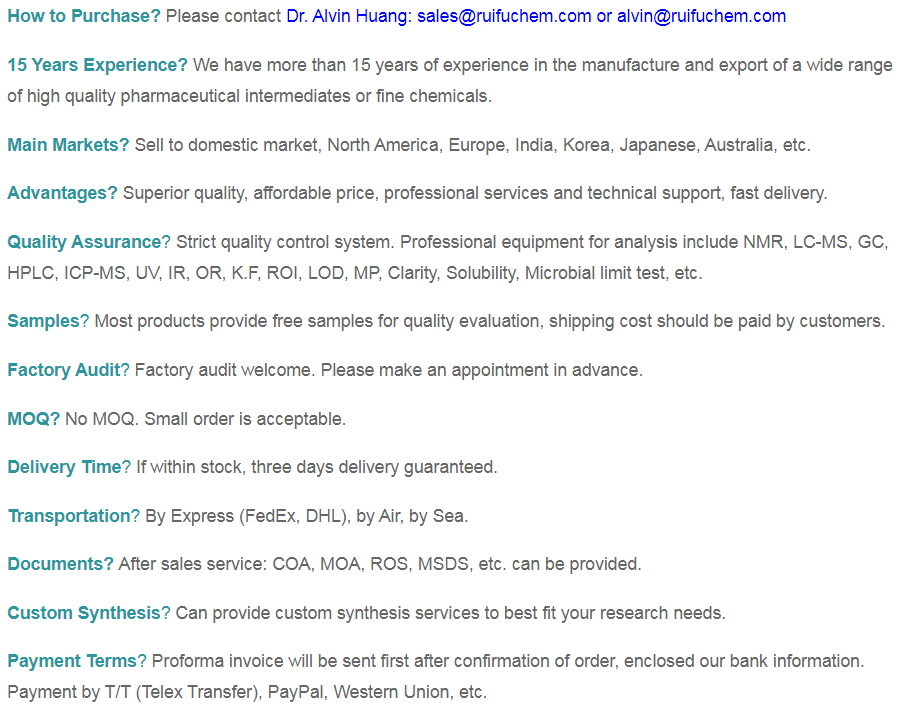
Palonosetron Hydrochloride (CAS: 135729-62-3) is a drug to inhibit nausea and vomiting, which is a new type highly selective, high-affinity 5-HT3 receptor antagonist that can block the vomiting reflex center peripheral neurons presynaptic 5-HT. Receptor excitement directly affects the central nervous system in 5-HT. Impulse receptor excitement generated by the role of vagal afferent nerve after area, blocking the vagus nerve endings in the gut, preventing signals to 5-HT. Receptor trigger zone can reduce the incidence of nausea and vomiting. Central clinically for the treatment of acute severe emetogenic chemotherapy induced delayed nausea and vomiting. Because of its high curative effect, little side effect, long half-life (about 40 h), small dosage, and so on, it has attracted much attention.
With 1,2,3,4-Tetrahydro-1-Naphthoic Acid as the starting material, the split, amination, reduction, cyclization, salt of palonosetron hydrochloride granisetron. Clinical studies showed that palonosetron can be used safely with corticosteroids, analgesics, antiemetics, antispasmodics and anticholinergic drugsas the starting material, the split, amination, reduction, cyclization, salt of palonosetron hydrochloride granisetron.
-
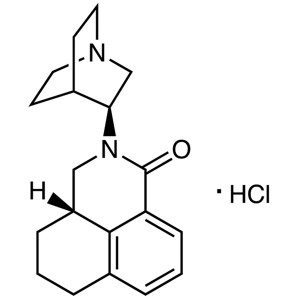
Palonosetron Hydrochloride CAS 135729-62-3 Puri...
-
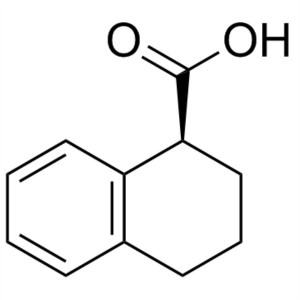
(S)-1,2,3,4-Tetrahydro-1-Naphthoic Acid CAS 859...
-
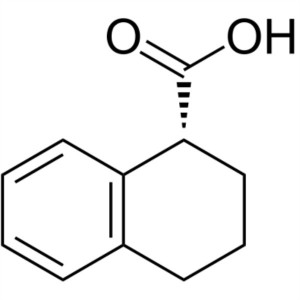
(R)-1,2,3,4-Tetrahedro-1-Naphthoic Acid CAS 233...
-
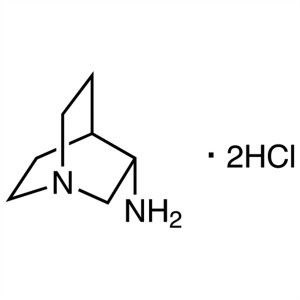
(S)-3-Aminoquinuclidine Dihydrochloride CAS 119...
-
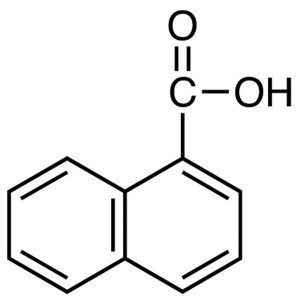
1-Naphthoic acid CAS 86-55-5 Purity ≥99.0% (HPL...
-
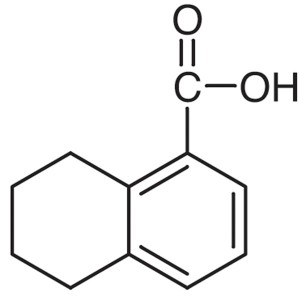
5,6,7,8-Tetrahydronaphthalene-1-Carboxylic Acid...

